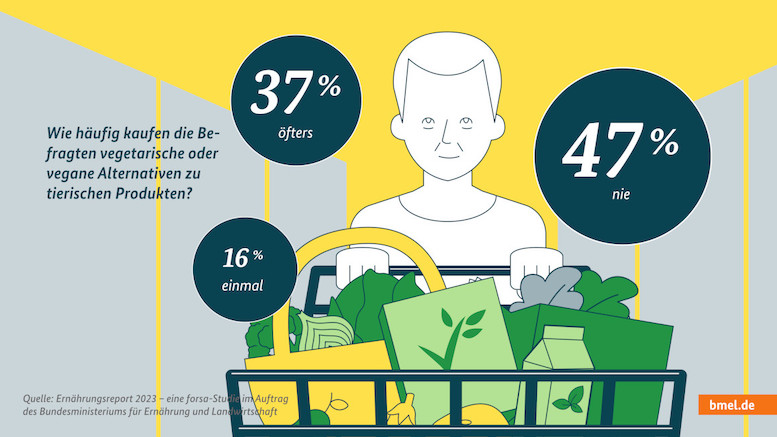Özdemir presents the 2023 nutrition report

Many people pay attention to the impact on the environment and climate when it comes to their diet. This is one of the results of this year's nutrition report from the Federal Ministry of Food and Agriculture (BMEL), which Federal Minister Cem Özdemir presented today. The daily consumption of plant-based alternatives to meat products has increased significantly. In 2015, one in three (34 percent) said they ate meat every day - currently it is only one in five (20 percent). Almost half of those surveyed (46 percent) consciously limit meat consumption. There is also a great desire for transparency, for example in the form of ingredient and origin labels.
Federal Minister Özdemir explains: "Our nutrition report makes it clear what is important to Germans when it comes to food. It has to taste natural. But for more and more consumers, the topic of sustainability is important: They want to know what ingredients are in their food and that it is environmentally friendly - and is produced in a climate-friendly way. This goes hand in hand with the fact that meat is served less often, and not just among younger people. A plant-based diet has long since become a billion-dollar market for manufacturers and retailers, as the world's largest food trade fair Anuga has just shown again in Cologne . The food culture in Germany is developing rapidly, you shouldn't turn it into a culture war."
The respondents are clear in their attitude towards animal welfare: the vast majority want politicians to promote more species-appropriate animal husbandry (91 percent). “With our package for future-proof animal husbandry, we are creating the conditions for animals to be kept better and for farmers to be paid fairly,” said Federal Minister Özdemir, referring to the Animal Husbandry Labeling Act that has just come into force, as well as changes to building law and clarifications regarding pollution control To simplify conversion to animal-friendly stables. “‘Made in Germany’ must also remain a trademark at the meat and sausage counter.”
The nutrition report also documents a great appreciation for the work of local agriculture. Around four fifths of those surveyed (78 to 88 percent) think it is important or very important that eggs, bread, fruit, vegetables, meat and sausage come from the region. Özdemir: “I am proud of our agriculture and the great products it produces. Citizens also trust in this. Good food is also very close. We are supporting consumers in their purchasing decisions by expanding national origin labeling – a long-standing demand from agriculture.”
The aim of the BMEL is to make good, healthy nutrition possible for all people – regardless of income, education or origin. This is where the federal government's nutrition strategy comes in, which should be adopted by the end of the year. The aim is in particular to provide more varied food in daycare centers, schools and canteens as well as a larger selection of healthy and sustainable food in supermarkets. Cem Özdemir says: “People want a good, healthy and sustainable diet. What ends up on your plate is and remains a highly personal decision. Our nutrition strategy helps you have real choice when it comes to eating.”
